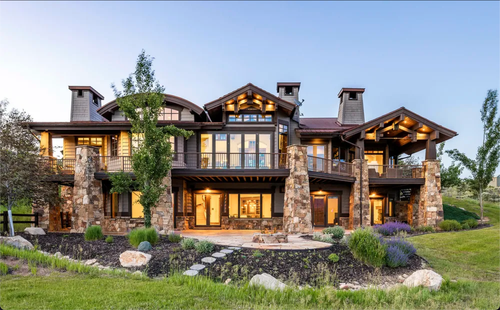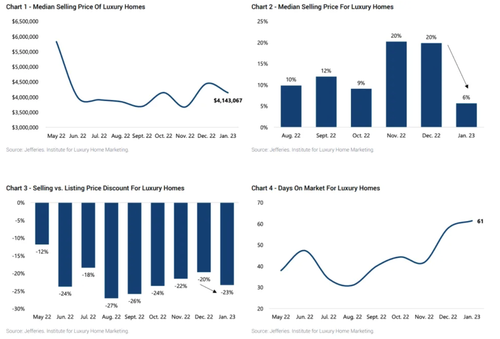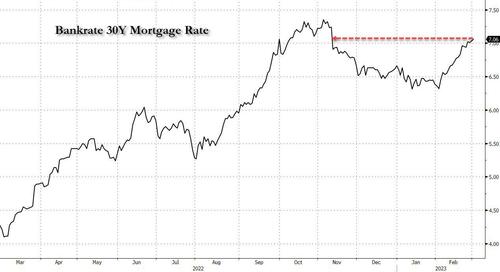
Luxury real estate has cooled in the past several months.
According to new research published by the Jefferies Group, the median price for a luxury home in 15 top US markets, which includes homes with listing prices above $2.5 million, increased by a measly 6% in January compared to the previous year. However, this growth represents a significant slowdown from December's 20% gain, a possible indication that a combination of high mortgage rates, stock, bond, and crypto turmoil, and reduction of banker bonuses could be pressuring the luxury home market.
Jonathan Matuszewski, an analyst at Jefferies, pointed out that Park City, Utah, was one of the country's most pressured luxury housing markets. The median price in the mountainous resort town declined by 30% in January. This was the second consecutive drop following a 6% decline in December.
Matuszewski wrote that the luxury home market is experiencing pressure due to technology layoffs and banks reducing bonuses.
"March 2023 data shows investment bank bonuses fell 30-50%," he said, adding, "Mid-level private equity professionals down ~33%."
Jefferies shows the luxury housing market lost momentum at the end of 2022, with sharp declines in the first month of this year.
The average rate on the 30-year fixed mortgage via Bankrate jumped back over 7%, rising to 7.06%, the highest level since early November.
The troubling findings were enough for Matuszewski to downgrade the upscale home goods retailer RH to Hold from Buy.
"We are downgrading to hold given a luxury housing market that's struggling to stabilize and corporate cuts to headcount / compensation that haven't yet rippled across the luxury home furnishings category.
"With the current multiple reasonably nestled between other luxury peers and more risk vs. reward heading into the '23 guide, we move to the sidelines," he said.
These are early signs affluent buyers are moving toward the sideline. The shift comes as higher-than-expected inflation means that global central banks will keep aggressively raising interest rates until something breaks.
Luxury real estate has cooled in the past several months.
According to new research published by the Jefferies Group, the median price for a luxury home in 15 top US markets, which includes homes with listing prices above $2.5 million, increased by a measly 6% in January compared to the previous year. However, this growth represents a significant slowdown from December’s 20% gain, a possible indication that a combination of high mortgage rates, stock, bond, and crypto turmoil, and reduction of banker bonuses could be pressuring the luxury home market.
Jonathan Matuszewski, an analyst at Jefferies, pointed out that Park City, Utah, was one of the country’s most pressured luxury housing markets. The median price in the mountainous resort town declined by 30% in January. This was the second consecutive drop following a 6% decline in December.
Matuszewski wrote that the luxury home market is experiencing pressure due to technology layoffs and banks reducing bonuses.
“March 2023 data shows investment bank bonuses fell 30-50%,” he said, adding, “Mid-level private equity professionals down ~33%.”
Jefferies shows the luxury housing market lost momentum at the end of 2022, with sharp declines in the first month of this year.
The average rate on the 30-year fixed mortgage via Bankrate jumped back over 7%, rising to 7.06%, the highest level since early November.
The troubling findings were enough for Matuszewski to downgrade the upscale home goods retailer RH to Hold from Buy.
“We are downgrading to hold given a luxury housing market that’s struggling to stabilize and corporate cuts to headcount / compensation that haven’t yet rippled across the luxury home furnishings category.
“With the current multiple reasonably nestled between other luxury peers and more risk vs. reward heading into the ’23 guide, we move to the sidelines,” he said.
These are early signs affluent buyers are moving toward the sideline. The shift comes as higher-than-expected inflation means that global central banks will keep aggressively raising interest rates until something breaks.
Loading…








